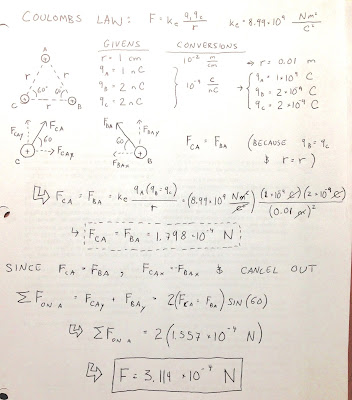
Part A:
What is the magnitude of the force F⃗ on the 1.0 nC charge in the figure?
Express your answer to two significant figures and include the appropriate units.
SOLUTION:
F = 3.1×10-4 N
Here's why ->
Part B:
What is the direction of the force F⃗ on the 1.0 nC charge in the figure?
SOLUTION:
Upward
What is the magnitude of the force F⃗ on the 1.0 nC charge in the figure?
Express your answer to two significant figures and include the appropriate units.
SOLUTION:
F = 3.1×10-4 N
Here's why ->
Part B:
What is the direction of the force F⃗ on the 1.0 nC charge in the figure?
SOLUTION:
Upward

This is hardly step by step. You didn't even show how you got the answer that you did.
ReplyDeleteI started posting my solutions halfway through the semester. By the end of the term I didn't have time to go back in and repeat the 'step by step' solutions. I had to copy and paste my answers before the website shut me out. Sorry that they aren't as complete as they could be, but I did work pretty hard on even posting what I did post so... sorry for not being completely thorough but hopefully you can still use what I have shared.
DeleteHowever, I finished the problem for you anyway. Hope this helps.
Deletethank you so much@ it did help and it is step by step
ReplyDeleteHappy to hear that! :)
DeleteHi, I was wondering how you got Part B. If they all have positive charges, why is the force facing up, towards the 1.0 nC particle? Why isn't the force down, because like forces repel?
ReplyDeleteThank you! (Also you're steps were really helpful for Part A, thank you so much)
Yes, the forces do repel. However, they interact along the dotted line. It's like the action-reaction pairs. The force of one of the particles on the 1.0 nC particle is going to be like Force of 2 on 1 which is a Force vector on 1.0 nC. Since they repel, the 2.0 nC would be "pushing" the 1.0 nC away along the dotted line, meaning the force would extend outwards and likewise for the other 2.0 nC. Hence, using vector addition you would get a net force going straight up, especially since it happens within an equilateral triangle shape.
DeleteThank you so much! Super helpful :)
ReplyDeletehow many degrees is it above the horizontal
ReplyDelete